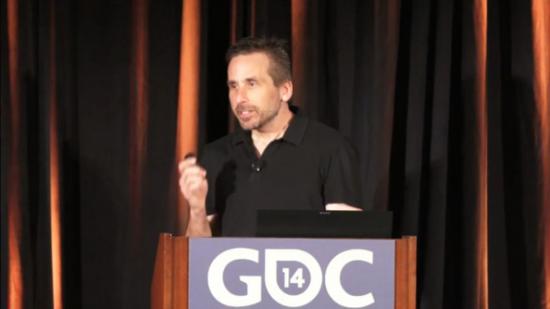In a presentation at GDC, “Narrative Legos with Ken Levine”, the System Shock 2 and BioShock Infinite creator discussed how designers can explore narratives that are non-linear, replayable and player-driven.
He was riffing, a little bit, exploring what developers – including himself – can do when they don’t limit players with artificial boundaries. He wasn’t announcing a new game, but rather detailing how he would like to approach game development in regards to the story.
Linear games don’t embrace the power of games, Levine said. They lock players into specific paths and don’t really encourage exploration and replayability. One of the building blocks of designing a narrative that makes the most of the medium are creating elements that interact with each other and trigger off player action – as in not locked into a specific script – and that these triggers should be transparent. These are the opportunities that, Levine believes, need to be offered to players.
Levine takes the structure of RPGs, where you’ve got crafting, non-linear quests, factions – he mentions Skyrim and Dark Cloud – and then applies the new approach. There are four villages, he proposes, one with elves, one with goblins, one with orcs and one with dwarves, and then there’s the player. Each village has a certain number of characters that matter, kept to a small number so as to not overwhelm the player.
What sets these specific NPCs apart are their core passions. These aren’t necessarily complex, psychological nature or minutae – this isn’t important. You don’t, he says, care if Luke Skywalker has tooth decay or is a vegetarian, you care about the important stuff that relates to the story.
Levine returns to the village, an orc one. The player meets an orc blacksmith. One of his passions is his hatred of elves. What matters in this passion is how it relates to the player. If the player kills and elf, he likes the player more; if the player helps an elf, then he dislikes this. These are things that players can affect. He also worships some gods and has a crush on another orc, and players can interact with these passions, like by building a temple to the orc’s god, in turn affecting what the orc thinks about the player.
The more the player interacts with the orc’s passions, the more interactions that open up. He’s a blacksmith, so maybe he reduces some prices, and maybe he encourages other NPCs to help the player out. But by going the opposite way, pissing him off, he might remove items from his shop, his dialogue reflecting the player’s actions and the resulting impact. And the way he feels about the player impacts how the lesser NPCs feel, creating a macro relationship with the entire village.
So dialogue, relationships, mechanics and gameplay are all intertwined.
Expanding this, Levine says that such things can create emotionally difficult decisions. You can help out, maybe even marry, an arsehole because they are filthy rich and you’ll get lots of rewards, or you can marry for love, but get few tangible rewards, yet there’s an emotional investment that’s just as important.
Rather than focusing on creating NPCs that mimic real people, with realistic AI, Levine thinks the key is to strip interactions down to their most important, impactful elements based around their needs and desires.
You can watch the whole presentation over here.
Cheers, Gamespot.
